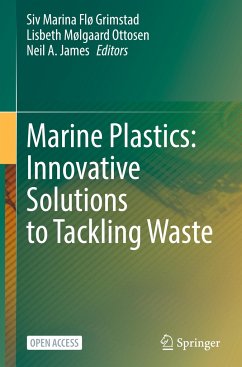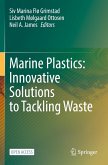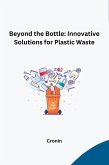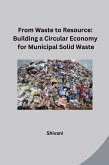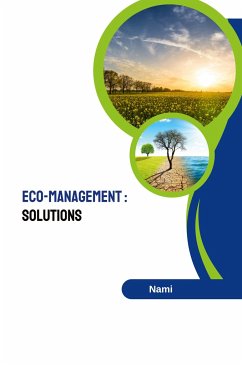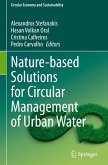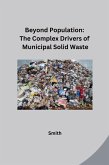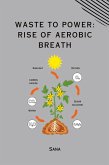Marine Plastics: Innovative Solutions to Tackling Waste
Herausgegeben:Grimstad, Siv Marina Flø; Ottosen, Lisbeth Mølgaard; James, Neil A.
Marine Plastics: Innovative Solutions to Tackling Waste
Herausgegeben:Grimstad, Siv Marina Flø; Ottosen, Lisbeth Mølgaard; James, Neil A.
- Gebundenes Buch
- Merkliste
- Auf die Merkliste
- Bewerten Bewerten
- Teilen
- Produkt teilen
- Produkterinnerung
- Produkterinnerung
This open access book reflects aims of the Blue Circular Economy (BCE) project, which focused on small and medium-sized enterprises (SMEs) aiming to create value using circular economy concepts related to products and services within fishing gear recycling in the Northern Periphery and Arctic (NPA) area. Cluster establishment and operation were carried out in collaboration with academia, industry and government agencies following a triple-helix approach.
Discarded fishing gear constitutes a large part of marine plastics. Preventing future discharge of fishing gear into the ocean is a vital…mehr
Andere Kunden interessierten sich auch für
![Marine Plastics: Innovative Solutions to Tackling Waste Marine Plastics: Innovative Solutions to Tackling Waste]() Marine Plastics: Innovative Solutions to Tackling Waste33,99 €
Marine Plastics: Innovative Solutions to Tackling Waste33,99 €![Beyond the Bottle: Innovative Solutions for Plastic Waste Beyond the Bottle: Innovative Solutions for Plastic Waste]() CroninBeyond the Bottle: Innovative Solutions for Plastic Waste30,39 €
CroninBeyond the Bottle: Innovative Solutions for Plastic Waste30,39 €![From Waste to Resource: Building a Circular Economy for Municipal Solid Waste From Waste to Resource: Building a Circular Economy for Municipal Solid Waste]() ShivaniFrom Waste to Resource: Building a Circular Economy for Municipal Solid Waste26,10 €
ShivaniFrom Waste to Resource: Building a Circular Economy for Municipal Solid Waste26,10 €![Eco-Management Solutions Eco-Management Solutions]() NamiEco-Management Solutions26,69 €
NamiEco-Management Solutions26,69 €![Nature-based Solutions for Circular Management of Urban Water Nature-based Solutions for Circular Management of Urban Water]() Nature-based Solutions for Circular Management of Urban Water108,99 €
Nature-based Solutions for Circular Management of Urban Water108,99 €![Beyond Population: The Complex Drivers of Municipal Solid Waste Beyond Population: The Complex Drivers of Municipal Solid Waste]() SmithBeyond Population: The Complex Drivers of Municipal Solid Waste28,39 €
SmithBeyond Population: The Complex Drivers of Municipal Solid Waste28,39 €![Waste to Power: Rise of Aerobic Breath Waste to Power: Rise of Aerobic Breath]() SanaWaste to Power: Rise of Aerobic Breath26,69 €
SanaWaste to Power: Rise of Aerobic Breath26,69 €-
-
-
This open access book reflects aims of the Blue Circular Economy (BCE) project, which focused on small and medium-sized enterprises (SMEs) aiming to create value using circular economy concepts related to products and services within fishing gear recycling in the Northern Periphery and Arctic (NPA) area. Cluster establishment and operation were carried out in collaboration with academia, industry and government agencies following a triple-helix approach.
Discarded fishing gear constitutes a large part of marine plastics. Preventing future discharge of fishing gear into the ocean is a vital step in combating plastic pollution. Circular economy is one of the tools in the European Green deal, targeting waste minimisation. Closing the loop for waste fishing nets by transferring them to a resource could be a solution for preventing discharge at sea: exploring this opportunity is at the core of this book.
Discarded fishing gear constitutes a large part of marine plastics. Preventing future discharge of fishing gear into the ocean is a vital step in combating plastic pollution. Circular economy is one of the tools in the European Green deal, targeting waste minimisation. Closing the loop for waste fishing nets by transferring them to a resource could be a solution for preventing discharge at sea: exploring this opportunity is at the core of this book.
Produktdetails
- Produktdetails
- Verlag: Norwegian University of Science and Technology / Springer / Springer Nature Switzerland / Springer,
- Artikelnr. des Verlages: 978-3-031-31057-7
- 1st ed. 2023
- Seitenzahl: 296
- Erscheinungstermin: 1. August 2023
- Englisch
- Abmessung: 241mm x 160mm x 21mm
- Gewicht: 665g
- ISBN-13: 9783031310577
- ISBN-10: 3031310578
- Artikelnr.: 67630098
- Herstellerkennzeichnung Die Herstellerinformationen sind derzeit nicht verfügbar.
- Verlag: Norwegian University of Science and Technology / Springer / Springer Nature Switzerland / Springer,
- Artikelnr. des Verlages: 978-3-031-31057-7
- 1st ed. 2023
- Seitenzahl: 296
- Erscheinungstermin: 1. August 2023
- Englisch
- Abmessung: 241mm x 160mm x 21mm
- Gewicht: 665g
- ISBN-13: 9783031310577
- ISBN-10: 3031310578
- Artikelnr.: 67630098
- Herstellerkennzeichnung Die Herstellerinformationen sind derzeit nicht verfügbar.
Siv Marina Flø Grimstad is Associate Professor at the Department of International Business (IIF), Norwegian University of Science and Technology (NTNU). Siv Marina was Project Coordinator for Blue Circular Economy, a EUR1.7-million project funded by the EU's Northern Periphery and Arctic Programme. This project aimed at developing sustainable solutions to marine plastic waste a litter and was a finalist in the RegioStars 2020 Awards. Currently, she is involved in Circnets a NPA-project which aims to make a Blueprint for the collection, treatment and reuse of EOL fishing gear for the NPA-region and to prepare the stakeholders involved in fishing business for the implementation of these legislative changes. Her research interests include international/global marketing, SMEs' internationalisation, international entrepreneurship, circular economy, sustainability and corporate social responsibility. Lisbeth M. Ottosen works at the Department of Environmental and Resource Engineering (DTU Sustain), Technical University of Denmark. Her research focus is on the reuse and recovery of resources in support of the transition towards a circular economy. Her major research lines are: (I) non-destructive testing for documentation of material quality in relation to the reuse of building components, (II) use of secondary resources in the production of new construction materials (mainly concrete and bricks) and (III) electrochemical processes for recovery of elemental resources such as phosphorous and heavy metals from particulate materials (ashes, soils, sludges and sediments). She has participated/led many national and international projects in the area between civil and environmental engineering. Lisbeth has a M.Sc. in civil engineering and received her Ph.D. within environmental technology. She is Author of more than 190 WoS indexed journal papers. Neil James is Research Fellow based at the Environmental Research Institute in Thurso, Scotland. With a background in Zoology and Marine Ecology, his broad research interests include applied approaches to tackling environmental contamination and developing sustainable resource use and circular economies in remote and rural regions, particularly in Northern Europe and the Arctic. Neil's research interests include the issues surrounding the presence, magnitude and effects of marine pollution of aquatic environments: marine plastic pollution, marine oil pollution, developing novel solutions to protect the environment and biota of remote and rural regions, including citizen science and sustainable and circular economies. Neil was Project Coordinator for Circular Ocean, a EUR1.5-million project funded by the EU's Northern Periphery and Arctic Programme. Circular Ocean won the prestigious EU RegioStars 2016 Inaugural Public Choice Award and was a finalist in the category Sustainable Growth: Circular Economy. Neil also worked on the project Blue Circular Economy which developed sustainable solutions to marine plastic waste and litter and was itself a finalist in the RegioStars 2020 Awards.
Chapter 1: Marine Mammals and Interactions with Debris in the Northeastern Atlantic Region: Synthesis and Recommendations for Monitoring and Research.- Chapter 2: A Conceptual Framework for Assessing and Managing Abandoned, Lost and Discarded Fishing Gear.- Chapter 3: Developing a circular economy for fishing gear in the Northern Periphery and Arctic Region: challenges and opportunities.- Chapter 4: Circular Business Models for SMEs in the Fishing Gear Industry.- Chapter 5: Opportunities for Circular Business Models and Circular Design related to Fishing Gear.- Chapter 6: Quadruple Helix Relational Approach to Recycling Fishing Nets: Cluster Development in the Norwegian West Coast Region.- Chapter 7: Life Cycle Assessment of Fishing and Aquaculture Gear Recycling.-Chapter 8: Engaging Volunteers as Experts in Data-Driven Research Projects and a Circular Economy: The Case of PlastOPol.- Chapter 9: The role of non-profit organizations (NGOs) in value creation: Lessons from the recycling of fishing gear in Norway.- Chapter 10: Sotenäs Marine Recycling Centre in Sweden: A Case Study related to Waste Fishing Gear.- Chapter 11: The effect of fishing nets aging on metal uptake.- Chapter 12: Possible applications for waste fishing nets in construction material.- Chapter 13: The influence of Involvement and Attribute Importance on Purchase Intentions for Green Products.- Chapter 14: Role of resource users' knowledge for developing realistic strategies for a circular economy for plastics from the Norwegian fishing sector.- Chapter 15: Concluding remarks.
Chapter 1: Marine Mammals and Interactions with Debris in the Northeastern Atlantic Region: Synthesis and Recommendations for Monitoring and Research.- Chapter 2: A Conceptual Framework for Assessing and Managing Abandoned, Lost and Discarded Fishing Gear.- Chapter 3: Developing a circular economy for fishing gear in the Northern Periphery and Arctic Region: challenges and opportunities.- Chapter 4: Circular Business Models for SMEs in the Fishing Gear Industry.- Chapter 5: Opportunities for Circular Business Models and Circular Design related to Fishing Gear.- Chapter 6: Quadruple Helix Relational Approach to Recycling Fishing Nets: Cluster Development in the Norwegian West Coast Region.- Chapter 7: Life Cycle Assessment of Fishing and Aquaculture Gear Recycling.-Chapter 8: Engaging Volunteers as Experts in Data-Driven Research Projects and a Circular Economy: The Case of PlastOPol.- Chapter 9: The role of non-profit organizations (NGOs) in value creation: Lessons from the recycling of fishing gear in Norway.- Chapter 10: Sotenäs Marine Recycling Centre in Sweden: A Case Study related to Waste Fishing Gear.- Chapter 11: The effect of fishing nets aging on metal uptake.- Chapter 12: Possible applications for waste fishing nets in construction material.- Chapter 13: The influence of Involvement and Attribute Importance on Purchase Intentions for Green Products.- Chapter 14: Role of resource users' knowledge for developing realistic strategies for a circular economy for plastics from the Norwegian fishing sector.- Chapter 15: Concluding remarks.

